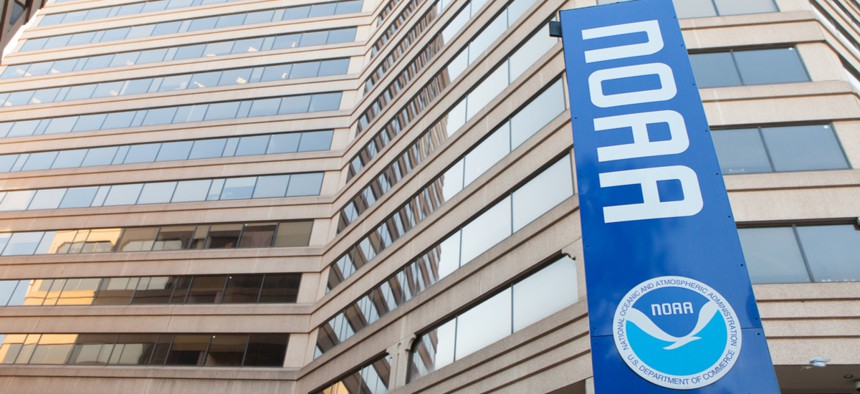Trump’s New Science Adviser Arrived Just in Time for a Shutdown

NOAA is one of the science agencies that has been shuttered. Mark Van Scyoc/Shutterstock.com
Science advocacy groups take turns imploring leaders to open agencies.
Kelvin Droegemeier, the Oklahoma meteorologist whom President Trump picked as White House science adviser, won last-minute Senate confirmation on Jan. 2, the final day of the 115th Congress.
Just in time to begin work in the midst of a partial government shutdown.
The appropriations lapse has not only idled or denied paychecks to employees at the National Oceanic and Atmospheric Administration, NASA, the Environmental Protection Agency and the National Science Foundation. Droegemeier’s own staff, according to the White House shutdown contingency plan, is down from 22 to six working employees.
Nonprofit science advocacy groups have mobilized members to implore the White House and congressional leaders, for the sake of time-sensitive scientific research, to negotiate an end to the stalemate that centers around Trump’s demand for a Southern border barrier.
At the closed National Science Foundation on Thursday, Director France Cordova sent an email to all employees saying, “As we conclude the fourth week of the longest funding lapse in history, I hope you are doing as well as the present circumstances allow. Your welfare and that of our agency are certainly on my mind these days.”
At the National Weather Service, “I’ve never seen morale as low as it is right now,” Dan Sobien, a 27-year veteran of the National Oceanic and Atmospheric Administration and president of the NWS employees organization, told Government Executive on Friday. True, the weather service is deemed “essential” for protection of life and property, so its core functions such as sending out forecasting alerts continue during the shutdown, he stressed.
Unlike the Transportation Security Administration, there are no employees calling in sick, he added, because, like air traffic controllers, weather forecasting “is a life-saving job, and no one is going to slow down their work if there’s a plane in the sky.”
But he said he does hear NWS colleagues “talking about sending out resumes. One tried to quit, but there was no one to process his papers,” Sobien added. “During these very trying times, we’re getting to the point where the Weather Service risks losing some of its best people.”
The National Weather Service Employees Organization has joined other unions in a lawsuit alleging that the government is violating the law by requiring federal employees deemed “essential” to work without pay. “No one knows yet what the damages will be,” Sobien said.
Elsewhere in the furlough-hit NOAA, an employee in the fisheries section told Government Executive,“Most furloughed employees are frustrated.” Many of the permit applications from water vessel owners, some of them scientific in purpose, are not currently being processed, and it’s unclear even to staff which ones have gone through, he said. Similarly, legislation passed last year that promotes recreational fishing for red snapper in the Gulf of Mexico is not being implemented, he said.
Out in the scientific community, the Federation of American Scientists on Wednesday sent a letter to President Trump and congressional leaders from both parties expressing “grave concerns over the negative impacts of the partial federal shutdown on our country’s research enterprise.”
It cited delays in “vehicle launches, monitoring of dangerous chemicals in the environment, inspection of food-processing facilities, control of invasive species” as well as pauses in potentially life-saving research into antibiotic resistance being done at the Agriculture Department’s National Center for Agricultural Utilization Research.
Rush Holt, CEO of the American Association for the Advancement of Science, told the PBS NewsHour on Jan. 9 that “thousands and thousands” of scientists are “running into delays, disruptions, [and] sometimes, ruination of their research projects.” He cited the example of a satellite science mission that has a certain launch window. “Suppose you're looking at insects, and you have to look during the week in the year when they mate,” he added. “You know, if the government is closed that week, and you can’t collect the data, that’s a problem.”
Also, the grant review and disbursement process at the NSF is stalled, Holt said.
The Union of Concerned Scientists on Jan. 8 put out an appeal to members and the public to send in detailed shutdown stories. “The enforcement of environmental protections grinds to a halt,” noted Michael Halpern, deputy director of the group’s Center for Science & Democracy. “Chemical facilities are not inspected. Agricultural technical assistance projects are shut down. The protection of species stops.”
In a blog post, Halpern added, “There is also enormous capacity that goes into preparing for and recovering from a government shutdown, capacity that could be better used to deliver government services. All because of the president’s inability to govern and negligent obsession with building a useless border wall.”






